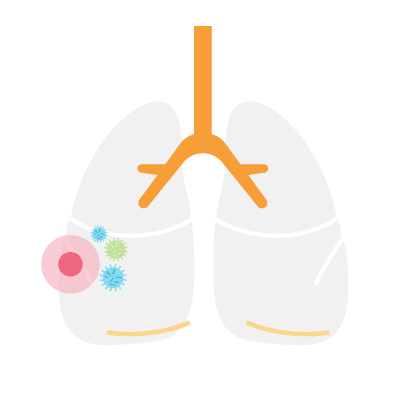
Small Cell Lung Cancer (SCLC)
Small cell lung cancer (SCLC) is a type of lung cancer which is considered distinct from other lung cancers, which are called non-small cell lung cancers (NSCLCs). About 10% to 15% of lung cancers are SCLC. SCLC grow quickly and spread (metastasise) via the bloodstream to the liver, lung, bones and brain. It is very common for tumor metastasis to be found in these organs at the time of diagnosis. Smoking is the leading risk factor for lung cancer and the risk is even higher for SCLC. This is why SCLC is quite rare in people who have never smoked. Survival in people with SCLC varies depending on the stage (extent) of the cancer when it is diagnosed. The unmet need is high in SCLC and the survival rate is lower than other cancers such as breast or prostate.
Clinical trials
A ‘clinical trial’ is a research study in which a potential new treatment is investigated to prevent, cure or improve a disease or medical condition. A clinical trial also looks at how participants react to the potential new treatment and if any unwanted effects occur. This helps to determine if the new investigational treatment works, is safe, and is better than those that are already available. Many clinical trials also compare existing treatments or test new ways to use or combine with existing treatments.
All new drugs must be tested in clinical trials before they can be prescribed to patients. Without people taking part in these research studies, we would have no new drugs to help others with their condition.
Clinical trial of Debio 1143 with nivolumab in specific advanced solid tumors
Debiopharm International is conducting an open-label two-part Phase 1b/2 trial in male and female patients with either small cell lung cancer, squamous cell carcinoma of the head and neck, selected gastrointestinal or gynecologic cancers with specific genetic alterations. Tumors with these genetic alterations may respond better to this study treatment. To be eligible, patients must have received at least one prior standard chemotherapy or have no established standard therapeutic alternatives. In addition, patients must have progressed during prior immuno-oncology treatment.
The purpose of Part B is to evaluate whether Debio 1143 combined with nivolumab leads to efficient shrinkage of the tumor in patients with different types of cancer and to determine how safe it is.
Debio 1143 is an investigational medicinal product. Nivolumab is a monoclonal antibody that specifically blocks a target in the body called PD-1 and stimulates the immune system to fight cancer cells.
Debio 1143 is administered orally once daily for 10 consecutive days every 2 weeks. Nivolumab is administered by infusion every 2 weeks.
-
Phases
When a potential new medication is being developed, it is first tested in a laboratory setting. If the results are positive, the drug may enter a clinical trial program. This means that it will be tested in humans in several ‘phases’ of study.
Phase I = Safety evaluation. The very first administration in humans, typically carried out in a small group of healthy volunteers to assess if the drug is safe.
Phase II = Efficacy evaluation. The first trials in patients with the intended disease to check if the drug works efficiently and if there are any unwanted side effects.
Phase III = Confirming findings. Trials in large numbers of patients that generally compare the drug to the best treatments available._Phases
- P
- Ⅰ
- Ⅱ
- Ⅲ
- M
Please share any related associations that may be useful